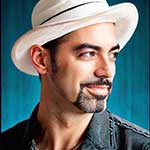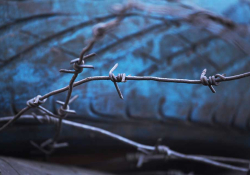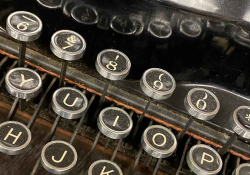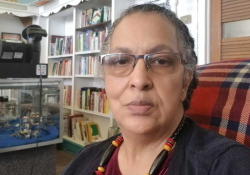The Failure of Misanthropy
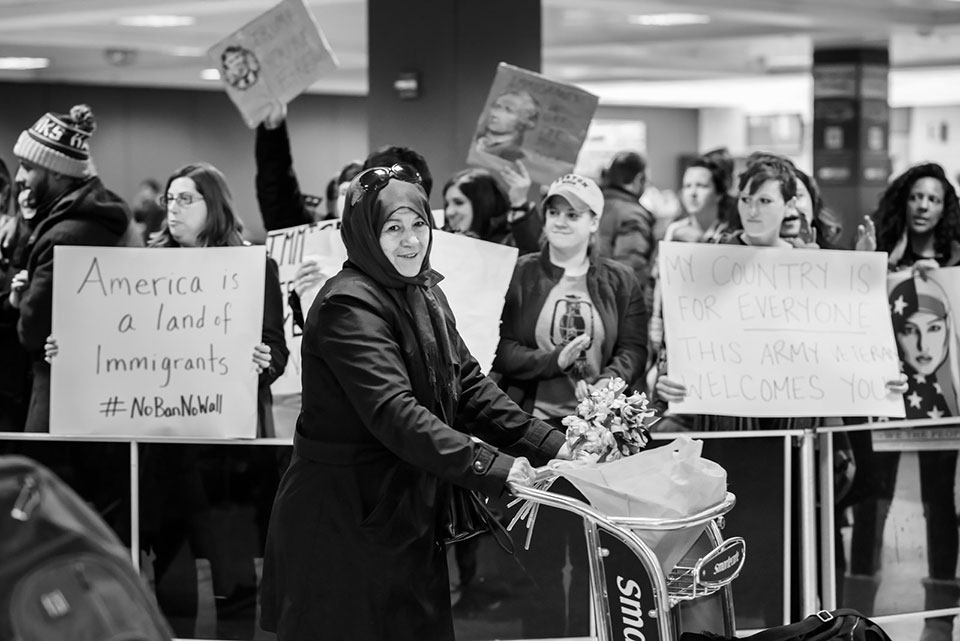
Czech writer Bohumil Hrabal used to say that he drew his worldview from a dry cleaner’s slip he came across in Prague, which warned clients that “some stains can only be removed by the destruction of the material itself.” If the stains are us, what if we were to take this risk?
I look at the lengthening shadow of violence and intolerance spreading across the Middle East, Europe, and, now, the Divided States of America and wonder if Donald Trump might not be the moral crisis we needed to awaken us to the world’s suffering and our interconnectedness.
How is it that we are told to Never Forget 9/11 and the nearly 3,000 lives taken, yet in the same breath we Never Remember the unjust “war” exacted in retribution and the hundreds of thousands of blameless, faceless Iraqi fatalities? There is no exchange rate for human suffering. All human life is sacred; all murder unholy.
There is no exchange rate for human suffering. All human life is sacred; all murder unholy.
Maybe we ask ourselves What is Aleppo?, and why should we care? In turn, we find ourselves confronted with gun violence at home, police brutality, the open wound of race relations, or the plaintive cry – as old as the creation of a nation – of Indigenous Americans at Standing Rock. Or physically and psychologically damaged war veterans, homelessness, uprootedness, refugees, ISIS – all terrorists in the shape of our shadows, all side-effects of the pandemic of indifference.
A prescription for our current malaise and how we might begin to heal can be found in these words by American psychiatrist M. Scott Peck:
How strange that we should ordinarily feel compelled to hide our wounds when we are all wounded! Community requires the ability to expose our wounds and weaknesses to our fellow creatures. It also requires the ability to be affected by the wounds of others. . . . But even more important is the love that arises among us when we share, both ways, our woundedness.
We forgive to live. As an Arab American bridge-of-a-man by the name of Gibran reminds us: “Hate is a dead thing. Who of you would be a tomb?” It bears repeating during this time of Islamophobic panic, when a thirteenth-century mystic, Jalāl ad-Dīn Muhammad Rūmī, is a best-selling poet in America. Rumi was a Muslim and also a refugee who lived in a turbulent time, not too dissimilar from our own. What glimmer of light, what lesson might we glean from this mysterious coincidence?
How is it that we readily accept that we are governed by physical laws yet believe that we can afford to turn our backs on age-old spiritual laws – Love, Compassion, Sacrifice, Mercy, Trust – without paying too high a price? The price of a New Chance – past the murderous folly in the Middle East and self-defeating arrogance of the US – is nothing less than surrendering our old, failed, broken ways.
Perhaps President Trump will Make America Great, Again, unwittingly, by bringing about a Reevaluation of Values. The peaceful, powerful Women’s March on Washington, DC, dwarfing in number those who attended his inauguration and echoing throughout the US as well as the world, seems to suggest that it might be safe to hope for change, again. Heartening, too, to witness impassioned rallies in airports throughout the country welcoming immigrants and protesting Trump’s unconstitutional executive order or “Muslim Ban.” Provoked by his administration’s disregard for science and denial of climate change, we can look forward to an upcoming Scientists’ March (the Facebook group created to support this event had more than 300,000 likes, last I checked).
For my part, as immigrant and writer, I think of my art as a sort of peace offering as well as a form of literary activism. Recently, I had the good fortune to play both roles (peacemaker and activist) by being part of an important new anthology, Truth to Power: Writers Respond to the Rhetoric of Hate and Fear (Cutthroat, 2017) alongside many fine writers such as Rita Dove, Patricia Smith, Martín Espada, Wendell Berry, Patricia Spears Jones, Alfred Corn, Sam Hamill, and many others. In Truth to Power, writers from diverse cultures / ethnic backgrounds respond in poetry, fiction, and nonfiction to pressing social issues raised by the campaign and election of Trump, including immigration, women’s rights, African American rights, and environmental issues.
Being a dual citizen of the US and Egypt, at this particular historical moment I see all too clearly how culturally diminished and spiritually impoverished we become when we close our doors to the world and our hearts to Others. I hope that my aphorisms, below, might serve as a reminder of our larger allegiances to one another.
* * *
The right to free speech ends where hate speech begins.
The bigot’s crime is twofold: not knowing others well enough to love them, and not knowing themselves enough to recognize their own hatred.
We are responsible for our enemies. Compassion is to realize the role we play in their creation.
Our morality is determined by the level of immorality that we can afford to live with.
Unheeded pricks of conscience might return as harpoons of circumstance.
We can lend ideas our breath, but Ideals require our entire lives.
As with all battles, how we fight determines who we become.
Every time we betray our conscience, we strangle an angel. Yet, it’s not certain we are allotted an infinite supply of winged pardons.
Where there are demons, there is something precious worth fighting for.
You can’t bury pain and not expect it to grow roots.
How attentive the forces of darkness are, how they rush to answer our ill-conceived wishes.
As you progress to the Light, notice how jealous shadows also redouble their efforts.
How vast the future that it can serve as a bottomless repository of all fears, hopes, and dreams.
Strange, how one hate enables another; how they are like unconscious allies, darkly united in blocking out the Light.
Buoyancy of the human spirit in the face of turbulence is the source of the miraculous.
In serving words, faithfully, we also serve one another.
Like incantations, certain word combinations can set a sentence or soul in motion.
In the deep end, every stroke counts.
Our salvation lies on the other side of our gravest danger.
To sense we are always at a great turning point is a sign of spiritual vitality.
There is a point in unlearning, where we cannot proceed any further – without Transformation.
Heaven save us from tragic seriousness; teach us to play, divinely.
Perhaps crisis is self-induced disaster – a last-ditch effort we gift ourselves to, finally, transform.
Best not flirt with disaster, lest it decide to commit.
We’re here to pass around the ball of Light while keeping our fingerprints off it.
The only failures are misanthropes.
Mistrust a person seeking power without a sense of humor – it usually translates into a lack of mercy.
A lesson to bullies, big and small: controlling others is a spiritual impossibility; those who try must exist in a state of existential insecurity.
Mercy is to cover the nakedness of others and stand beside them – naked, yourself.

